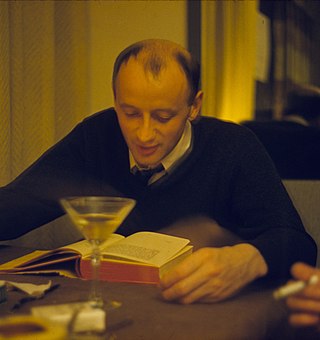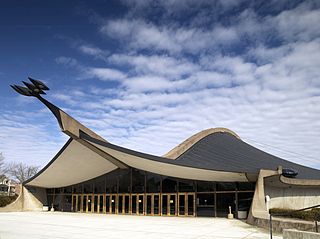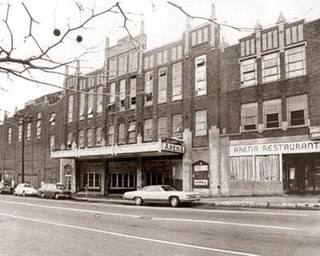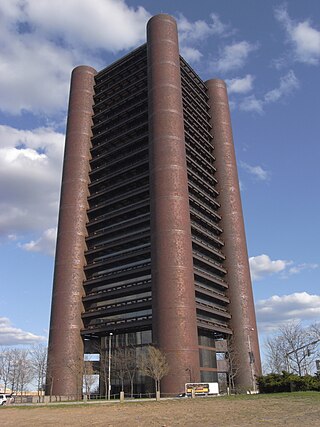
Eamonn Kevin Roche was an Irish-born American Pritzker Prize-winning architect. He was responsible for the design/master planning for over 200 built projects in both the U.S. and abroad. These projects include eight museums, 38 corporate headquarters, seven research facilities, performing arts centers, theaters, and campus buildings for six universities. In 1967 he created the master plan for the Metropolitan Museum of Art, and thereafter designed all of the new wings and installation of many collections including the reopened American and Islamic wings.

New Haven is a city in New Haven County, Connecticut, United States. It is located on New Haven Harbor on the northern shore of Long Island Sound and is part of the New York City metropolitan area. With a population of 135,081 as determined by the 2020 U.S. census, New Haven is the third largest city in Connecticut after Bridgeport and Stamford, the largest city in the South Central Connecticut Planning Region, and the principal municipality of Greater New Haven, which had a total population of 864,835 in 2020. Prior to 1960, it was the county seat of New Haven County until the county governments were abolished that year.
The Colosseum is an elliptical amphitheater in Rome, Italy.

East Haven is a town in New Haven County, Connecticut, in the United States. As of the 2020 census, the town population was 27,923. The town is located 3 miles (5 km) east of New Haven, and is part of the South Central Connecticut Planning Region. East Haven is 35 miles (56 km) from Hartford, 82 miles (132 km) from New York City, 99 miles (159 km) from Providence, Rhode Island, and 140 miles (230 km) from Boston.

New Haven Coliseum was a sports and entertainment arena located in downtown New Haven, Connecticut. Construction began in 1968 and was completed in 1972. The Coliseum was officially closed on September 1, 2002, by Mayor John DeStefano Jr., and demolished by implosion on January 20, 2007.

Northlands Coliseum is a defunct indoor arena in Edmonton, Alberta, on the north side of Northlands. It was used for sports events and concerts, and was home to the Edmonton Oilers of the World Hockey Association (WHA) and National Hockey League (NHL), and the Edmonton Oil Kings of the Western Hockey League (WHL). The arena opened in 1974, and was later known as Edmonton Coliseum, Skyreach Centre, and Rexall Place, before returning to the Northlands Coliseum name in summer 2016.

The Greensboro Coliseum Complex, commonly referred to as Greensboro Coliseum, is an entertainment and sports complex located in Greensboro, North Carolina. Opened in 1959, the complex holds eight venues that includes an amphitheater, arena, aquatic center, banquet hall, convention center, museum, theatre, and an indoor pavilion. It is the home of the UNC Greensboro Spartans men's basketball team, the Greensboro Swarm of the NBA G League, the Carolina Cobras of the National Arena League, as well as the Atlantic Coast Conference (ACC) with their Men's and Women's basketball tournaments.

The Veterans Memorial Coliseum is an indoor arena located in the oldest part of the Rose Quarter area in Portland, Oregon. The arena is the home of the Portland Winterhawks, a major junior ice hockey team, and was the original home of the Portland Trail Blazers of the National Basketball Association. It has been included on the National Register of Historic Places in recognition of its architectural significance.
Winnipeg Arena was an indoor arena located in the Polo Park district of Winnipeg, Manitoba, Canada.

David S. Ingalls Rink is a hockey rink in New Haven, Connecticut, designed by architect Eero Saarinen and built between 1953 and 1958 for Yale University. It is commonly referred to as The Whale, due to its shape. The building was constructed for $1.5 million, which was double its original cost estimate. It seats 3,500 people and has a maximum ceiling height of 23 meters (75 ft). The building is named for David S. Ingalls, Yale class of 1920, and David S. Ingalls, Jr., Yale class of 1956, both of whom were hockey captains. Members of the Ingalls family were the primary benefactors of the arena. The building was included on the America's Favorite Architecture list, created in 2007 by the American Institute of Architects.

The XL Center is a multi-purpose arena and convention center located in downtown Hartford, Connecticut. Owned by the City of Hartford, it is managed by the quasi-public Capital Region Development Authority (CRDA) under a lease with the city and operated by Spectra. In December 2007, the center was renamed when the arena's naming rights were sold to XL Group insurance company in a six-year agreement. The arena is ranked the 28th largest among college basketball arenas. It opened in 1975 as the Hartford Civic Center and was originally located adjacent to Civic Center Mall, which was demolished in 2004. It consists of two facilities: the Veterans Memorial Coliseum and the Exhibition Center.

John DeStefano Jr. is an American politician who served as the 49th mayor of New Haven, Connecticut, from 1994 until 2014. He was the Democratic nominee in 2006 for Governor of Connecticut, unsuccessfully challenging incumbent Republican Governor M. Jodi Rell. He was also the named defendant in the landmark 2009 U.S. Supreme Court case of Ricci v. DeStefano. John DeStefano is the son of a New Haven police officer. John and his wife Kathy DeStefano met at the University of Connecticut as undergraduates, where he also earned a Masters in Public Administration. Kathy DeStefano is a first grade teacher in West Haven, Connecticut, and they are the parents of two adult sons.

The Beast of New Haven were an ice hockey team in the American Hockey League in the 1997–98 and 1998–99 seasons. The team was based in New Haven, Connecticut, and played at the Veterans Memorial Coliseum, which was demolished in 2007. The Beast were affiliated with the Carolina Hurricanes and the Florida Panthers. This franchise was known as the Carolina Monarchs from 1995 to 1997.

New Haven Arena was an indoor arena on Grove Street in New Haven, Connecticut, that served as a venue for ice hockey, concerts, and circuses.

The Knights of Columbus Building, in Downtown New Haven, Connecticut, is the headquarters of the Roman Catholic fraternal service organization, the Knights of Columbus. Also known as the Knights of Columbus Tower or The Knights' Tower, the building was designed by Kevin Roche John Dinkeloo and Associates and finished in 1969. This 23-story modern style reinforced concrete building, at 320 feet tall, is the third-tallest building in the city's skyline.

Connecticut Public Radio, commonly known as WNPR, is a network of public radio stations in the state of Connecticut, western Massachusetts, and eastern Long Island, affiliated with NPR. It is owned by Connecticut Public Broadcasting Network, which also owns Connecticut Public Television (CPTV).
Professional ice hockey in Connecticut has a rich tradition dating from the mid-1920s. Most of these teams were NHL minor league affiliates located in New Haven, though with the closure of the New Haven Coliseum, minor league affiliates now exist only exist in Hartford and Bridgeport. Hartford had its own Major league team, the Whalers team that existed in Hartford from 1974-97. Independent hockey leagues teams have also been gaining a foothold in Danbury starting in 2004.
Gorman Bechard is an American film director, screenwriter and novelist best known for his independent feature films Psychos in Love,Friends, and You Are Alone; his four rock documentaries Color Me Obsessed: A Film About the Replacements,What Did You Expect? The Archers of Loaf Live at Cat's Cradle,Every Everything: The Music, Life & Times of Grant Hart, and Who is Lydia Loveless?; his animal welfare documentary A Dog Named Gucci; and his debut novel The Second Greatest Story Ever Told.
New Haven Documentary Film Festival is an annual documentary film festival held in New Haven, Connecticut, in early June. Screenings take place at Yale University’s Whitney Humanities Center Auditorium, the New Haven Free Public Library and at the rock club Cafe Nine. NHdocs is a regional festival that showcases documentaries by filmmakers from the greater New Haven area and beyond. NHdocs was launched in 2014 when the film festival’s co-founders Charles Musser, Gorman Bechard, Jacob Bricca, and Lisa Molomot came together at the Big Sky Documentary Film Festival and decided to create a documentary film festival in New Haven that would “build a sense of community among documentary filmmakers from the greater New Haven area.” In 2014, the four filmmakers each showed one of their recently completed documentaries, three of which had just played at the Big Sky.
The Kate is an American public television music program recorded live at the Katharine Hepburn Cultural Arts Center in Old Saybrook, Connecticut. It is produced by Public Broadcasting Service (PBS) member television station CPTV and is broadcast on PBS stations across the United States.













